一般过去时翻译句子
一般过去时的用法

一般过去时的用法一般过去时表示过去某个时间发生的动作或存在的状态。
常和表示过去的时间状语连用。
如:last year, yesterday等;也可表示过去经常反复发生的动作,常和often, always等频率副词连用。
例如:I saw him in the street yesterday. 昨天我在街上看见他了。
Li Mei always went to school on foot last year. 去年李梅总是步行上学。
注意:也可以用“used to +动词原形”表示过去经常或反复的动作。
eg. We used to get up early. 我以前总是早起。
(意指现在不早起了)1.一般过去时的形式:动词be: 第一人称单数和第三人称单数用was, 其余的人称一律用were。
动词have: 一律用had, 没有人称和数的变化。
行为动词:一律用过去式,没有人称和数的变化,行为动词的过去式有两类,一类是规则动词,另一类是不规则动词。
一般过去时动词的肯定、否定、一般疑问句和简略回答以及特殊疑问句的形式见列表:肯定、否定形式行为动词的过去时的否定式,要使用助动词do 的过去式did,后面的谓语动词要还原为原形。
注意:在非正式语如口语中,was not, were not, had not和did not 可以分别缩写成wasn’t, weren’t, hadn’t和didn’t。
2.一般过去时的几种句型(这里只讲行为动词)肯定句结构为:主语+动词的过去式+其他。
如:He went to the toy store yesterday. 他昨天去玩具店了。
否定句结构为:主语+did not (didn’t)+动词原形+其他。
如:He didn’t go to the toy store yesterday. 他昨天没去玩具店。
一般疑问句的构成:Did+主语+动词原形+其他?如:1) -Did you go to Beijing last week?-Yes, we did. (No, we didn't.)2) -Did you meet the businessman before?-No, I didn't. (Yes, I did.)特殊疑问句的构成:疑问词+did+主语+动词原形+其他?如:1) -What did you do last night?-I did my homework.2) -Where did you go last week?-I went to Shanghai with my parents.Ⅱ. 行为动词的一般过去式变化规则行为动词的过去式有规则变化和不规则变化两种。
五种基本时态

(3).表达主语过去旳特征或性格等. e.g. At that time she spoke very good English.
五种常见时态旳基本构造:
一、一般目前时:①is /am/are; ②动词原形及动词第三人称单数
二、一般过去时: ①was/were;②动词过去式
三、目前进行时:am/is/are + doing
四、一般将来时:①am/is/are/going to + do; ②will/shall + do.
五、目前完毕时: have/has + done
(go) 6.There __________ a physics test next Monday. (be) 7. Wei Fang ______ English every morning. (hear) 8. John stopped __________ a rest (have) because
口语中大量使用be going to 构造表达事先 打算有意图要发生旳动作或客观情况下即 将要发生旳动作。
Look at the clouds. It is going to rain.
常用时间状语:tomorrow /next day(week, month, year… )/ in a few minutes / soon /the day after tomorrow/ this evening ect 。
一般过去时英文作文带翻译
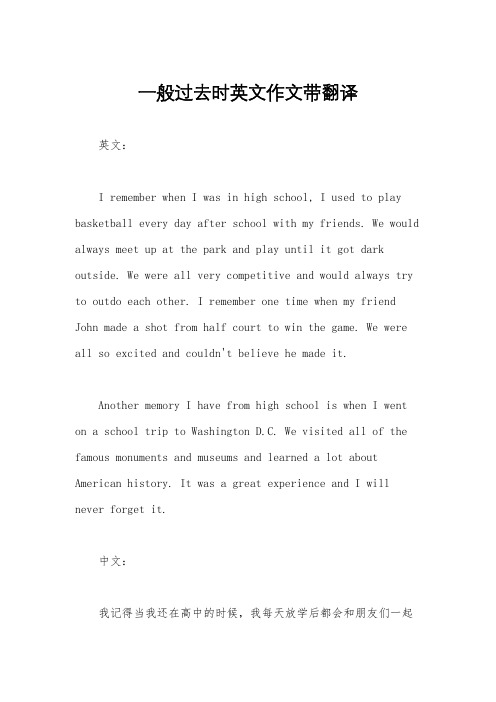
一般过去时英文作文带翻译英文:I remember when I was in high school, I used to play basketball every day after school with my friends. We would always meet up at the park and play until it got dark outside. We were all very competitive and would always try to outdo each other. I remember one time when my friend John made a shot from half court to win the game. We were all so excited and couldn't believe he made it.Another memory I have from high school is when I went on a school trip to Washington D.C. We visited all of the famous monuments and museums and learned a lot about American history. It was a great experience and I will never forget it.中文:我记得当我还在高中的时候,我每天放学后都会和朋友们一起打篮球。
我们总是在公园碰面,玩到天黑。
我们都很有竞争心,总是想超越对方。
我记得有一次我的朋友约翰从半场投篮得分,赢了比赛。
我们都很兴奋,不敢相信他真的投进了。
另一个我在高中时的记忆是我参加了一次到华盛顿特区的学校旅行。
我们参观了所有著名的纪念碑和博物馆,学到了很多关于美国历史的知识。
一般过去时句型
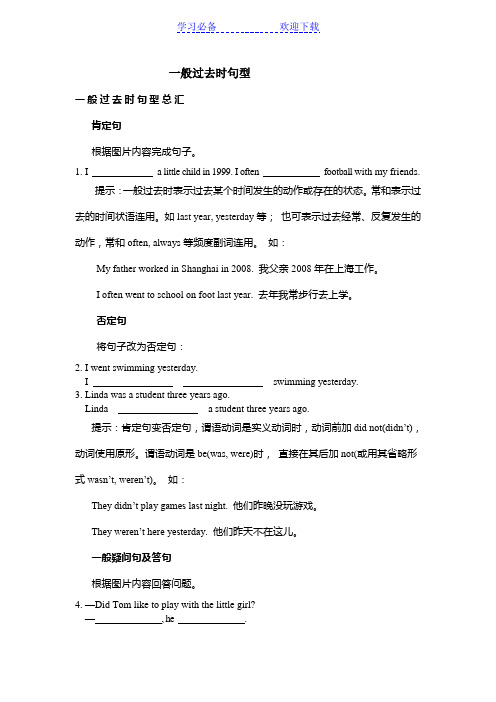
一般过去时句型一般过去时句型总汇肯定句根据图片内容完成句子。
1. I a little child in 1999. I often football with my friends.提示:一般过去时表示过去某个时间发生的动作或存在的状态。
常和表示过去的时间状语连用。
如last year, yesterday等;也可表示过去经常、反复发生的动作,常和often, always等频度副词连用。
如:My father worked in Shanghai in 2008. 我父亲2008年在上海工作。
I often went to school on foot last year. 去年我常步行去上学。
否定句将句子改为否定句:2. I went swimming yesterday.I swimming yesterday.3. Linda was a student three years ago.Linda a student three years ago.提示:肯定句变否定句,谓语动词是实义动词时,动词前加did not(didn’t),动词使用原形。
谓语动词是be(was, were)时,直接在其后加not(或用其省略形式wasn’t, weren’t)。
如:They didn’t play games last night. 他们昨晚没玩游戏。
They weren’t here yesterday. 他们昨天不在这儿。
一般疑问句及答句根据图片内容回答问题。
4. —Did Tom like to play with the little girl?—, he .提示:陈述句变为一般疑问句时,若谓语是be,将was / were 提前到句首;若谓语是实义动词,在句首加did, 将动词过去式返回原形。
回答用Yes, 主语+ was / were / did. 或No, 主语+ wasn’t / weren’t / didn’t. 如:—Was she a teacher in 1996? 1996年她是老师吗?—No, she wasn’t. 不,不是。
六年级英语一般过去时句子及翻译
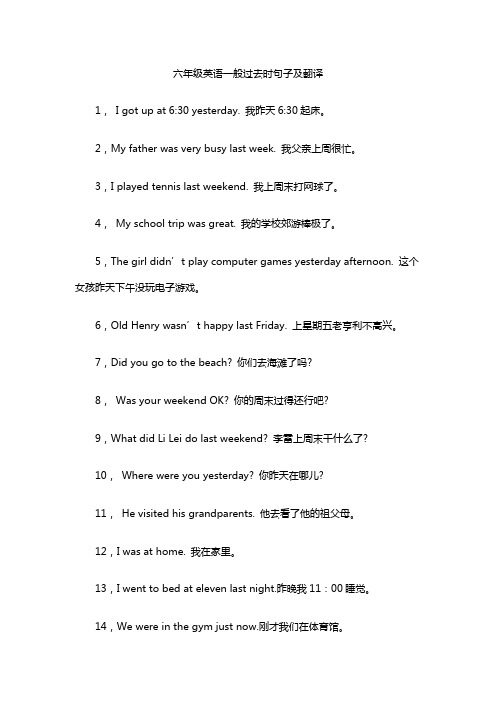
六年级英语一般过去时句子及翻译
1,I got up at 6:30 yesterday. 我昨天6:30起床。
2,My father was very busy last week. 我父亲上周很忙。
3,I played tennis last weekend. 我上周末打网球了。
4,My school trip was great. 我的学校郊游棒极了。
5,The girl didn’t play computer games yesterday afternoon. 这个女孩昨天下午没玩电子游戏。
6,Old Henry wasn’t happy last Friday. 上星期五老亨利不高兴。
7,Did you go to the beach? 你们去海滩了吗?
8,Was your weekend OK? 你的周末过得还行吧?
9,What did Li Lei do last weekend? 李雷上周末干什么了?
10,Where were you yesterday? 你昨天在哪儿?
11,He visited his grandparents. 他去看了他的祖父母。
12,I was at home. 我在家里。
13,I went to bed at eleven last night.昨晚我11:00睡觉。
14,We were in the gym just now.刚才我们在体育馆。
15,I visited my uncle yesterday.昨天我拜访了我的叔叔。
一般过去时

句式
肯定句: 肯定句: 主语+动词的过去式 动词的过去式+其它 主语 动词的过去式 其它
I walked to school yesterday. 昨天我走路去学校。 walked在这里是 在这里是walk的一般过去式。 的一般过去式。 在这里是 的一般过去式 和进行时态动词要加ing变成现在分词一样,一般过 变成现在分词一样, 和进行时态动词要加 变成现在分词一样 去式也有它的表现方式就是加ed, 去式也有它的表现方式就是加 ,当然也有特殊的 变化,上节课我们已经学过be动词的过去式是 动词的过去式是was/ 变化,上节课我们已经学过 动词的过去式是 were。现在我们来看一下行为动词的一般过去式 。 是怎么变化的. 是怎么变化的
I walked to school yesterday. ② ① ③ ① Who walked to school yesterday? ② Where did you walk to yesterday? ③ When did you walk to school?
动词过去式的构成
规则动词在动词的词尾加-ed构成过去式, 其变化规则可速记为 “直一般情况 ”“改”“双”。 play-playde 直”“去 去 改 双 在词尾直接加-ed 在词尾直接加
walk-walked like-liked love-loved study-studied carry-carried stop-stopped do-did have-had 以e结尾 结尾 只加-d 只加
以“辅音字母+y” 变y为i,再加 辅音字母 为 ,再加-ed 结尾 末尾只有一个辅音 重读闭音节结尾 字母,要双写再加 字母, -ed 特殊情况 不规则变化
教你一招
一般过去时翻译练习

1.你今天早上做运动了吗2.你的儿子昨天早上去上学了吗3.你昨天晚上几点钟去睡觉的4.你昨天早上去了哪里5.你的孩子什么时候做他/她的家庭作业6.你上周感冒了吗7.你的老公今天早上几点起床的8.你什么时候看望了你的父母9.你和你的朋友们上周末看了电影吗10.你老公昨天是怎样去上班的1.你的同学们昨晚学习英语了吗2.昨天谁为你煮了午餐3.你和你的家人上周末待在家里面了吗4.你们去年去哪儿度假了5.你今天是走路来学校的吗6.你在来说听易之前学习过英语吗7.你的孩子上周末做了什么8.你是几点钟做了你的家庭作业的9.Fred 什么时候给你们上了课10.你去年买了新房子吗1.你今天早上看了新闻了吗2.你昨天去了哪儿3.你上次吃火锅是什么时候4.你的孩子怎么去上学的5.你老公什么时候给你礼物了6.你昨晚几点钟看电视的7.你去年给了你妈妈什么作为生日礼物8.你昨天给谁打了9.你以前头通过吗10.你几点钟到学校的1.你今天早上7:00起床了吗2.早餐后你做了什么3.你几点钟吃午餐的4.你昨天学习了多长时间的英语5.昨天谁教了你们英语6.你什么时候去购物的7.你昨晚睡得好吗8.你昨天感觉怎么样9.你妈妈什么时候给你煮了饭10.你去过哪些国家1.昨天你和你的孩子过了儿童节了吗2.你昨天感觉怎么样3.你老公去年送了你什么生日礼物4.你今天早上看了报纸了吗5.你去过美国了吗6.你的孩子今天早上几点起床的7.你什么时候买的杂货8.你老公昨晚睡得早吗9.你昨天几点吃晚餐的10.上周末你和你的家人看电影了吗1.你以前住在哪儿2.你去年买了一辆车吗3.你的父母什么时候和你一起吃了晚餐4.你昨天来学校上课了吗5.(LI)老师上周二教了你们吗6.你什么时候乘坐了公交车7.你几点钟洗澡的8.你和你的同学们昨天下午说了英语吗9.你昨天在教室里面待了多长时间10.你今天化妆了吗。
一般过去时作文带翻译

一般过去时作文带翻译I woke up early this morning and went for a run in the park. It was a beautiful day with the sun shining and the birds chirping. I used to go running every morning, but I haven't been doing it as often as I used to. I miss the feeling of the fresh air in my lungs and the sense of accomplishment after a good run.英文回答:This morning, I woke up early and went for a run in the park. It was a beautiful day with the sun shining and the birds chirping. I used to go running every morning, but I haven't been doing it as often as I used to. I miss the feeling of the fresh air in my lungs and the sense of accomplishment after a good run.中文回答:今天早上,我起得很早,去公园跑步。
天气很好,阳光明媚,鸟儿在叫。
我过去经常每天早上都去跑步,但现在不像以前那样经常去了。
我很怀念感觉新鲜空气充满肺部的感觉,以及跑步后的成就感。
After my run, I went to a local café to grab a cup of coffee. I used to come here all the time with my friends, but now I usually just grab a coffee to go. It's not the same as sitting and chatting with friends over a cup of coffee. I miss those days when we would spend hours at the café, laughing and sharing stories.英文回答:After my run, I went to a local café to grab a cup of coffee. I used to come here all the time with my friends, but now I usually just grab a coffee to go. It's not the same as sitting and chatting with friends over a cup of coffee. I miss those days when we would spend hours at the café, laughing and sharing stories.中文回答:跑步后,我去了一家当地的咖啡馆买了一杯咖啡。
一般过去式与过去进行时英语语法
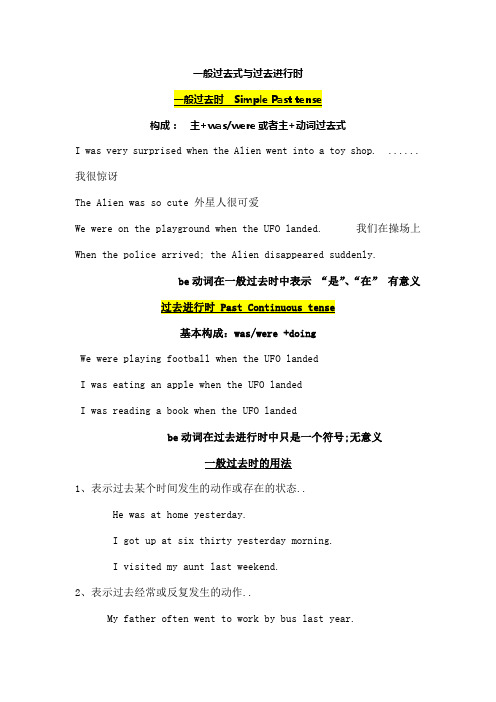
一般过去式与过去进行时构成:主+was/were或者主+动词过去式I was very surprised when the Alien went into a toy shop. ......我很惊讶The Alien was so cute 外星人很可爱We were on the playground when the UFO landed. 我们在操场上When the police arrived; the Alien disappeared suddenly.be动词在一般过去时中表示“是”、“在”有意义基本构成:was/were +doingWe were playing football when the UFO landedI was eating an apple when the UFO landedI was reading a book when the UFO landedbe动词在过去进行时中只是一个符号;无意义一般过去时的用法1、表示过去某个时间发生的动作或存在的状态..He was at home yesterday.I got up at six thirty yesterday morning.I visited my aunt last weekend.2、表示过去经常或反复发生的动作..My father often went to work by bus last year.When I was a child; I often listened to music.He always carried an umbrella.常与一般过去时态连用的时间有:①yesterday; yesterday morning; the day before yesterday②last night last week; last month; last year…③two days ago; three years ago…a moment ago=just now刚才④in 1990; in 1998…⑤this morning; this Monday⑥When I was 5 years old过去进行时的用法:一、过去进行时常表示过去某一时刻或过去某一阶段内正在进行的动作..过去某一时刻1.昨天的这个时候我正在做作业..I was doing my homework at this time yesterday.过去某一阶段内2.昨晚我一直在作业..I was doing my homework last night.二、过去进行时可描述故事发生的背景..一个长动作发生的时候;另一个短动作突然发生..长动作延续性动词用过去进行时;短动作点动词用一般过去时..当两种时态用于同一个句子时;过去进行时描述故事发生的背景;过去时报道该事件..When my mother came back; I was watching TV.when + 一般过去时;过去进行时I was watching TV when my mother came back.过去进行时 ; when + 一般过去时三、过去进行时可表示两个动作同时进行;有时含“对比”的含义..过去进行时 + while +过去进行时When I was watching TV; my mother was cooking.当我在看电视时;我母亲在做饭..注:两个动作同时发生;并且都是长动作延续性动词时;才能都用过去进行时 ..四、过去进行时常与always;forever等连用;表示厌恶;埋怨;表扬;喜爱等感情色彩..My father was always smoking when he was young.埋怨She was always thinking of others. 表扬She was forever complaining. 厌恶注:下列几类动词通常不用过去进行时..①表示状态的动词be;②感官动词:feel;hear;see;smell;taste等;③表示思维或心理状态的动词:believe认为;forget;consider考虑认为;know;understand;remember;hope;wish;want等;④表示所属关系的动词:belong属于;have;own拥有;hold容纳等过去进行时与一般过去时的区别过去进行时着重描述当时正在持续进行的动作;强调过程;一般过去时表示发生过的动作或存在的状态;即表示动作发生过;或者已经结束了;强调事实或结果..She wrote a letter to her friend last night.她昨晚给她的朋友写了封信信写完了She was writing a letter to her friend last night.她昨晚一直在给她的朋友写信..信不一定写完翻译练习:1.昨天上午7点你在做什么2.有一天当他在河边散步的时候;刚好看见有人自杀commit suicide3.我们正在下棋;突然电话响了..4.当你回来时;他在看电视吗5.昨晚我在看电视;我的父亲在看书..Linda loves her dog Davy. They went to New York City last Saturday. While Linda was buying a newspaper at the train station; the dog got out of his box and ran away. The station was crowded and Linda couldn't see Davy anywhere. When Linda shouted his name; some peoplelooked at her but Davy didn't come. Then she called the police. While she was talking on the telephone; Davy met another dog outside the station. While the police were coming; Linda walked around the station and called Davy' s name. She didn't think about looking outside the station. Finally; a little boy said to her; "Did you look outside I saw a big black dog when I came in. "When Linda finally saw Davy; he was jumping and running with another dog. There was a police officer next to them. The police officer said to Linda; "I think my dog found your dog."46. What was Linda doing when Davy ran away47. How was the station48. What did Linda do when she couldn't find her dog49.What did Linda do when the police were coming50. What was Davy doing when Linda saw itLang Lang was born in 1982 in Shenyang; China. He watch a Tom and Jerry cartoon on television when he first hear Western classical music. He be only two years old then. Lang Lang begin taking piano lessons at the age of three. He won many awards he was young.However; Lang Lang's success came at a price. His father bevery strict with him. He practice the piano while other children of his age play games and having fun . In Beijing; Lang Lang enter the finest music academy in China.At the age of just 17; Lang Lang got his big chance. In August 1999; at a famous musical event in the USA; a pianist suddenly fell ill. Lang Lang was chosen to play in place of that pianist. It was a great success and Lang Lang's life change forever.。
最新一般过去时详解+例句

最新一般过去时详解+例句一、单项选择一般过去时1.—How long have you been going to work on foot?—Since last month when I ________ from a heart attack.A.recovered B.have recoveredC.was recovering D.would recover【答案】A【解析】【详解】考查时态。
句意:——你步行上班已经多长时间了?——自上个月我心脏病康复开始。
last month是过去的的时间点,应该与过去时连用,when引导定语从句,指代last month,指上个月我从心脏病康复。
用一般过去时。
故选A。
2.—Mary will not attend the party tonight.—But she she would!A.has promised B.promisedC.will promise D.promises【答案】B【解析】考查动词的时态。
——玛丽今晚不参加聚会。
——但是她许诺她将会来。
根据上文Mary will not attend the party tonight.可知,“promise”这一动作发生在过去,主语she与promise是主动关系。
故选B。
3.--- Such a small mistake could have been avoided.--- Yes. But I too nervous to see the zero.A.am B.have beenC.was D.had been【答案】C【解析】【详解】考查时态。
句意:——这样一个小错误本来是可以避免的。
——是的。
但是我太紧张了,看不到零点。
由could have been avoided(本来可以避免)可知双方在谈论过去的事。
故选C。
4.---- Have you ever been to Provence which is home to lavender(薰衣草) in Paris?---- Yes, only once. I ________ there for a week.A.had stayed B.were staying C.have stayed D.stayed【答案】D【解析】考查时态。
一般过去时现在进行时一般现在时一般将来时的用法

一般过去时的用法一、概念1.表示在的过去某个时间里所发生的动作或存在的状态。
时间状语有:yesterday, last week, an hour ago, in 1982等。
如:1)I was at the zoo yesterday. 昨天我在动物园。
2)I went to bed at eleven last nigth. 昨晚我11:00睡觉。
2.表示在过去一段时间内,经常性或习惯性的动作。
1)When I was a child, I often played football in the street.我在小的时候,我经常在街道上踢足球。
2)My father often drove to work last year. 去年,我爸爸经常开车上班。
二、句子结构1.在表示某个时间里存在的状态的句子,系动词用过式was,were构成。
如:(1)I was at home yesterday.昨天我在家。
(2)We were in the gym just now. 刚才我们在体育馆。
2.在表示过去某个时间里发生的动作,用动词的过去式构成。
如:I visited my uncle yesterday. 昨天我拜访了我的叔叔。
3.各种句式(1)一般过去时的肯定陈述句:主语+动词过去式+宾语或表语。
He worked in Shanghai ten years ago.(2)一般过去时的否定句:a.主语+didn’t +动词原形+宾语。
(did + not = didn't)He didn't do morning exercises yesterday.b.主语+wasn’t/weren’t +表语。
(was + not = wasn't were + not = weren't)He wasn't an English teacher ten years ago.(3)一般过去时的一般疑问句:a.Did +主语+动词原形+宾语?Did you study English in 1990 ?b.Was/Were+ 主语+表语?Was he a pupil five years ago ?(4)一般过去时的特殊疑问句:a.特殊疑问词+did + 主语+动词原形+宾语?Where did your parents live five years ago?What did you do last Sunday?b.特殊疑问词+were/was +表语?Who was at the zoo yesterday三、时间特征在一般过去时句子中,通常与下列表示过去的时间状语连用:yesterday, yesterday morning, yesterday afternoon, yesterday evening, the day before yesterday(前天), last night, last week, last month, last year, a moment ago(刚才), just now(刚才), two days ago, a week ago, in 1990,…四、动词过去式的构成规律(一)规则动词的过去式1.一般情况下,在动词原形后面加-ed。
一般现在时、现在进行时、一般过去时翻译练习
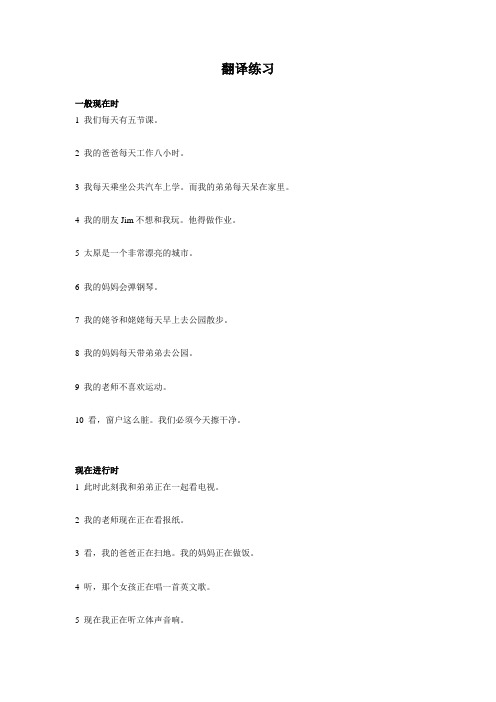
翻译练习一般现在时1 我们每天有五节课。
2 我的爸爸每天工作八小时。
3 我每天乘坐公共汽车上学。
而我的弟弟每天呆在家里。
4 我的朋友Jim不想和我玩。
他得做作业。
5 太原是一个非常漂亮的城市。
6 我的妈妈会弹钢琴。
7 我的姥爷和姥姥每天早上去公园散步。
8 我的妈妈每天带弟弟去公园。
9 我的老师不喜欢运动。
10 看,窗户这么脏。
我们必须今天擦干净。
现在进行时1 此时此刻我和弟弟正在一起看电视。
2 我的老师现在正在看报纸。
3 看,我的爸爸正在扫地。
我的妈妈正在做饭。
4 听,那个女孩正在唱一首英文歌。
5 现在我正在听立体声音响。
6 请安静!我的妈妈正在和她的朋友讲电话。
7 关掉电视吧!我的弟弟正在卧室睡觉。
8 我们正在一起放风筝。
9 我的表姐和表弟正在操场上打羽毛球。
10 我们都在用英语相互聊天。
一般过去时1 上周我举行了一个生日派对。
2 昨天我和弟弟去公园。
3 我今天早晨吃了两颗鸡蛋。
我的弟弟只吃了一颗。
4 我今天没有吃午饭。
现在下午六点了,我很饿。
5 我的爸妈上周没有带我去图书馆。
6 去年我去北京了,在那我参观了长城。
7 上个月我们没有看电影。
8 我的弟弟昨天听了一个英文故事。
9 我的朋友Jim前天来我家。
我们一起玩游戏。
10 我今天没有外出,只是呆在家做作业。
外研社中学教材全解八大时态句子翻译(中英文对译版)

外研社中学教材全解八大时态句子翻译(中英文版)(一)外研社七年级上册Module7-10一般现在时句子翻译Module7 My school day1.我喜欢数学。
I like maths!2.我们在九点上英语课。
We have an English lesson at nine o’clock.3.他今天不上语文课。
He doesn’t have Chinese today.4.我们不喜欢这首歌。
We don’t like the song.5.你们起床很早吗?Do you get up early?Module8 Different habits1.托尼一直喜欢生日聚会。
Tony always likes birthday parties.2.门总是开着的。
The door is always open.3.他经常收到一些有趣的信件。
He often gets some interesting letters.4.他的生日礼物是一张电影票。
His birthday present is a cinema ticket.5.她经常穿一双红色的袜子。
She often wears a pair of red socks.6.她没有记住他的名字。
She doesn’t remember his name.Module9 A trip to the zoo1.老虎吃肉吗?Does the tiger eat meat?2.袋鼠来自澳大利亚。
The kangaroo comes from Australia.3.它是一头非洲象吗?Is it an African elephant?4.森林里有成千上万棵古树。
There are thousands of old trees in the forest.5.老虎生活在森林里。
The tiger lives in the forest.6.它吃草和树叶。
It eats grass and leaves.7.中国大约有1600只野生大熊猫。
一般过去时英文作文带翻译

一般过去时英文作文带翻译Title: A Day in My Childhood。
When I was a child, life was simpler. I lived in a small village surrounded by lush green fields and towering mountains. Every morning, I would wake up to the chirping of birds and the gentle rays of the sun filtering through the curtains of my room. 。
I remember vividly how my day would start with the aroma of freshly brewed tea wafting through the house. My mother, a kind and gentle woman, would be busy in the kitchen preparing breakfast while humming a melodious tune.I would eagerly wait for her to finish so that I could devour the delicious homemade pancakes she made with love.After breakfast, I would head out to meet my friends. We would spend hours exploring the countryside, climbing trees, and chasing each other around. Our laughter echoed through the valleys as we played hide and seek among thetall grass.One of my favorite places to visit was the old oak tree at the edge of the village. Its branches stretched out like welcoming arms, offering shade from the scorching sun. I would often sit beneath its canopy, lost in my own thoughts, while the gentle breeze whispered secrets in my ear.As the day wore on, I would reluctantly return home for lunch. My father, a hardworking man with calloused hands, would be waiting for me with a smile. We would sit together at the table, sharing stories of our day while enjoying a hearty meal prepared by my mother.In the afternoon, I would help my parents with chores around the house. Whether it was tending to the garden or feeding the chickens, I took pride in contributing to our family's well-being. As the sun began to set, signaling the end of another day, I would retreat to my room, tired but content.Looking back, I realize how fortunate I was to havesuch a simple and happy childhood. Those carefree days spent in the embrace of nature and surrounded by loved ones will always hold a special place in my heart.我是个特别喜欢发呆的孩子,小时候最喜欢躲在树荫下发呆,那时候真的感觉时间过得特别慢。
一般过去时

一般过去时一、一般过去时的定义一般过去时表示过去某一时候或某一段时间所发生了的事情或存在的状态。
常与过去时间yesterday, this morning, just now, a moment ago, in May, last night / year / week, once upon a time, the other day, before …, when – clause, in the past连用。
如:What did you do yesterday 昨天你干了什么I met Lin Tao this morning. 今天上午我会到了林涛。
I was there a moment ago. 刚才我在那儿二、用法说明1表示在过去某个时间所发生的动作或所处的状态。
常与yesterday, last week, in 1989, just now, a moment ago, the other day等连用。
如:He was here just now. 他刚才还在这里。
What did you do yesterday 你昨天做了什么事2在过去一段时间内的经常性或习惯性动作。
如:We often played together when we were children. 我们小时候常在一起玩。
注:表示过去经常发生的动作还可用used to 和would。
如:He used to smoke a lot, but he doesn’t now. 他过去经常抽烟,但现在不抽了。
Whenever we were in trouble, he would help us. 每当我们遇到困难,他都会帮助我们。
3表示主语过去的特征或性格。
如:At that time she was very good at English. 那时她英语学得很好。
4用在状语从句中表示过去将来。
如:He said he would wait until they came back.5一般过去时有时可以表示现在,多与 want, hope, wonder, think, intend 等动词连用,使语气更委婉。
- 1、下载文档前请自行甄别文档内容的完整性,平台不提供额外的编辑、内容补充、找答案等附加服务。
- 2、"仅部分预览"的文档,不可在线预览部分如存在完整性等问题,可反馈申请退款(可完整预览的文档不适用该条件!)。
- 3、如文档侵犯您的权益,请联系客服反馈,我们会尽快为您处理(人工客服工作时间:9:00-18:30)。
一般过去时翻译句子
1. 我过了一个忙碌但却刺激的周末。
I exciting weekend.
2. Jenny喜欢看书。
昨晚她看了一本英语书。
Jenny likes . She an English book last night.
3. Emma每天都看电视。
可是昨天他没有看。
Emma TV every day. But he yesterday.
4. 上周六他们做什么了?他们做作业和购物了。
What they Saturday?
They homework and .
5. 今天早上方方得做饭,因为他父亲不在家。
This morning Fangfang ____ ____ ____ ____ because his father _____ _____ ____ yesterday.
6. 你还有什么要说的?
What would you like ?
7. 放学别忘了向老师说声再见。
Don’t forget ______ _______ _______ _______ the teacher.
8. 为什么你昨晚没有看电视?
Why _______ you _______ TV last night?
9. 他在打扫教室的时候,发现地上有块表。
When he the classroom, he a watch on the ground.
10. 他什么时候出生的?1980年。
-- When he ?
-- 1980.
翻译答案
1. spent a busy but
2. reading books; read
3. watches; didn't watch TV
4. did; do last; did their; went shopping
5. had to cook breakfast; wasn't at home
6. else; to say;
7. to say goodbye to 8. did; watch
9. cleaned; found 10. was; born; In。
